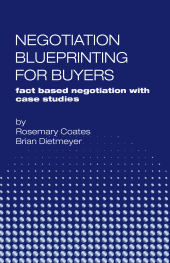Determining the answer to this question is important because it affects how both sides think of the negotiation and, as a result, how they behave. Those who think they have more power in the negotiation tend to overestimate the value of their offer. As a result, they're more likely to play hardball in the negotiation and are less willing to consider making trades. And when either side is unwilling to make trades, it makes creating value difficult for both sides and increases the likelihood of impasse. On the other hand, those who think they have less power are likely to underestimate the value of their offer, are likely to roll over too easily, and, in the process, unnecessarily give up value to the other side.
Interestingly, our experience has taught us that both sellers and buyers are likely to misdiagnose who has the power. They both tend to think the other side has more power in any given situation. We've heard the same statement from both the buy and sell sides: "They have us over a barrel in this negotiation."
 Let's see who you think has the power in each of these real-life negotiation scenerios. Click on each link to review:
Let's see who you think has the power in each of these real-life negotiation scenerios. Click on each link to review:





